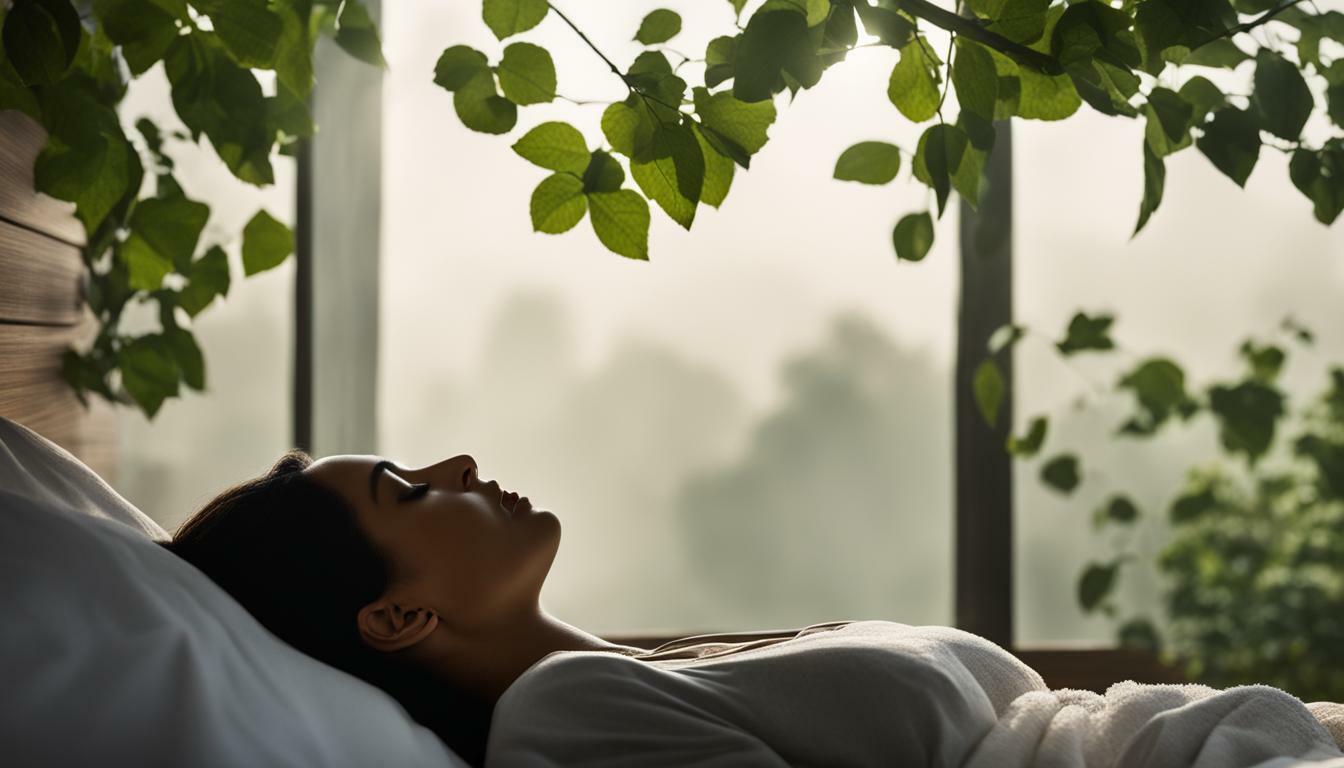If you are a light sleeper, you may find it challenging to stay asleep throughout the night. Light sleepers are individuals who wake up easily due to small disturbances in their sleep environment. This can include noise, light, temperature changes, and movement.
Light sleepers tend to have a lower arousal threshold, which means they are more sensitive to stimuli than heavy sleepers. This sensitivity is due to the brain’s ability to maintain wakefulness during sleep. During light sleep, the brain produces sleep spindles, which help filter out external stimuli and maintain sleep. However, in light sleepers, the brain is more sensitive to these stimuli, which can cause them to wake up.

While genetics can play a role in determining whether you are a light sleeper or not, environmental factors can also contribute. For example, stress, anxiety, and certain medications can disrupt sleep and make it harder to stay asleep.
It’s important to understand the different sleep stages when discussing light sleepers. Non-REM sleep, which includes light sleep and deep sleep stages, makes up the majority of the sleep cycle. During non-REM sleep, the body repairs and restores itself. REM sleep, which occurs later in the sleep cycle, is when dreaming occurs.
Table of Contents
Creating a Sleep-Inducing Environment

As a light sleeper, creating a sleep-inducing environment is crucial for getting a good night’s rest. Here are some effective solutions to help you create the perfect sleep environment:
Control Lighting
Light can be a major disruptor for light sleepers. To minimize the impact of light on your sleep, consider using blackout curtains or shades to block out any outside light. If you prefer a little bit of light, try using a dimmer switch or a nightlight. Alternatively, you can wear an eye mask to block out any light that may be keeping you awake.
Minimize Noise
Noise is another common disruptor for light sleepers. If you live in a noisy area, consider using earplugs or a white noise machine to help drown out any outside noise. Alternatively, you can use a fan or a wind machine to create a soothing background noise that can help you relax and fall asleep.
Optimize Temperature
Temperature can also play a significant role in your sleep quality. If your bedroom is too warm, you may find it difficult to fall asleep and stay asleep. On the other hand, if it’s too cold, you may wake up feeling uncomfortable. The ideal temperature for sleep is around 65 degrees Fahrenheit. Consider using a thermostat to regulate the temperature in your bedroom and ensure that it stays at a comfortable level throughout the night.
Establishing a Healthy Sleep Routine
As a light sleeper, establishing a healthy sleep routine can be an effective solution to improve the quality of your sleep. Here are some tips to help you develop a healthy sleep routine.
Regulate Sleep Schedule
Regulating your sleep schedule is one of the most important steps in developing a healthy sleep routine. Try to go to bed and wake up at the same time every day, even on weekends. This will help regulate your body’s internal clock and improve the quality of your sleep.
Develop a Bedtime Routine
Developing a bedtime routine can help signal your body that it’s time to sleep. Some things you can include in your bedtime routine are turning off screens, meditating, reading a book, or adjusting your bedroom environment. Try to avoid stimulating activities, such as watching TV or using your phone, before bed.
Manage Diet and Exercise
Your diet and exercise habits can also affect the quality of your sleep. Avoid consuming caffeine and large meals before bedtime, as they can interfere with your sleep. Similarly, avoid consuming alcohol before bed, as it can disrupt your sleep cycle. Exercise during the day can help you fall asleep faster and improve the quality of your sleep.
Remember that developing a healthy sleep routine takes time and patience. Try to be consistent with your routine and make adjustments as needed. If you’re having trouble falling asleep, consider trying relaxation techniques or taking a short nap during the day to help you feel more rested.
Addressing Psychological Factors
Light sleeping can be caused by a variety of psychological factors, including stress, anxiety, and sleep disorders. Addressing these underlying issues can help improve sleep quality and overall well-being.
Reduce Stress and Anxiety
Stress and anxiety can cause light sleeping by keeping your mind active and preventing you from relaxing. To reduce stress and anxiety, try the following relaxation techniques:
- Deep breathing exercises
- Progressive muscle relaxation
- Meditation
- Yoga
These techniques can help calm your mind and body, making it easier to fall and stay asleep. Additionally, getting regular exercise and practicing good sleep hygiene can also help reduce stress and anxiety.
Treat Sleep Disorders
If you suspect that you have a sleep disorder, such as insomnia or sleep apnea, it is important to seek treatment. These disorders can cause light sleeping by disrupting your sleep cycle and preventing you from getting the rest you need.
Treatment options for sleep disorders may include:
- Medications
- Behavioral therapy
- Continuous positive airway pressure (CPAP) therapy for sleep apnea
- Dental devices for sleep apnea
Leveraging Sleep Aids and Technology
Utilize Sleep Gadgets
If you’re a light sleeper, sleep gadgets can be an excellent way to help you get a good night’s rest. Some popular gadgets include eye masks, earplugs, and white noise machines.
Eye masks can help block out light that may be keeping you awake, while earplugs can help reduce noise disturbances. White noise machines can also be helpful in creating a soothing sleep environment.
In addition to these traditional sleep gadgets, there are also electronic devices that can help you sleep better. For example, some devices emit blue light, which can disrupt your sleep cycle. By turning off electronics before bed or utilizing blue light blocking glasses, you can help your body recognize that it’s time to sleep.
Consider Supplements and Medication
If sleep gadgets aren’t doing the trick, you may want to consider supplements or medication. Magnesium supplements are a popular option for light sleepers, as they can help relax the body and promote better sleep. Over-the-counter sleep aids can also be helpful, but it’s important to talk to your doctor before trying any new medication.
While medication can be effective, it’s important to remember that it’s not a long-term solution. It’s always best to try natural remedies first and only turn to medication as a last resort.
Adapting Lifestyle for Better Sleep
As a light sleeper, making lifestyle changes can help you get a more restful sleep. Here are some tips to consider:
Maintain Good Sleep Hygiene
Sleep hygiene refers to the habits and practices that promote good sleep. Here are some tips to help you maintain good sleep hygiene:
- Stick to a consistent sleep schedule by going to bed and waking up at the same time every day, even on weekends.
- Create a relaxing bedtime routine to signal to your body that it’s time to sleep. This might include taking a warm bath, reading a book, or listening to calming music.
- Avoid caffeine, nicotine, and alcohol, especially in the evening.
- Make sure your bedroom is cool, dark, and quiet. Consider using earplugs or a white noise machine to block out any noise that might disturb your sleep.
Make Healthy Lifestyle Choices
Your overall health can impact your sleep quality. Here are some healthy lifestyle choices to consider:
- Eat a balanced diet that includes plenty of fruits, vegetables, and whole grains. Avoid heavy meals close to bedtime.
- Exercise regularly, but not too close to bedtime. Aim for at least 30 minutes of moderate exercise most days of the week.
- Limit your exposure to screens, especially in the evening. The blue light emitted by electronic devices can disrupt your circadian rhythm, making it harder to fall asleep.
Prioritize Quality of Life
Stress and anxiety can interfere with your ability to get a good night’s sleep. Here are some ways to prioritize your quality of life:
- Practice stress-reducing techniques like deep breathing, meditation, or yoga.
- Make time for hobbies and activities you enjoy.
- Connect with friends and family for support and social interaction.
Frequently Asked Questions
What methods can help improve sleep quality for those with a light sleeper personality?
There are several methods that can help improve sleep quality for light sleepers. One effective method is to create a relaxing sleep environment. This can involve minimizing noise and light in the bedroom, using comfortable bedding, and adjusting the temperature to a comfortable level. Additionally, practicing relaxation techniques such as meditation or deep breathing exercises can help calm the mind and promote restful sleep.
How can one manage the symptoms commonly associated with being a light sleeper?
Managing the symptoms associated with being a light sleeper can involve a combination of lifestyle changes and medical interventions. Some lifestyle changes that can help include establishing a regular sleep routine, avoiding caffeine and alcohol before bedtime, and engaging in regular exercise. Medical interventions can include the use of sleep aids such as melatonin or prescription medications.
What are the most effective sleep aids for individuals who wake easily during the night?
There are several effective sleep aids that can help individuals who wake easily during the night. These include over-the-counter sleep aids such as melatonin or valerian root, as well as prescription medications such as benzodiazepines or non-benzodiazepine hypnotics. However, it is important to consult with a healthcare professional before using any sleep aids.
Is there a correlation between light sleeping and cognitive function, and can sleep patterns be adjusted accordingly?
There is a correlation between light sleeping and cognitive function, as individuals who experience disrupted sleep may experience cognitive impairment. However, sleep patterns can be adjusted accordingly through the use of sleep hygiene techniques and medical interventions such as cognitive-behavioral therapy for insomnia.
Can adopting certain habits or routines help transition from light to deep sleep?
Adopting certain habits or routines can help transition from light to deep sleep. These can include establishing a regular sleep routine, creating a relaxing sleep environment, and engaging in relaxation techniques such as meditation or deep breathing exercises.
What strategies can mitigate the challenges faced by light sleepers in shared sleeping environments?
Strategies that can mitigate the challenges faced by light sleepers in shared sleeping environments include using white noise machines or earplugs to block out noise, using eye masks to block out light, and establishing clear boundaries with sleep partners to minimize disruptions. Additionally, seeking the advice of a healthcare professional can help identify any underlying medical conditions that may be contributing to sleep disruptions.


